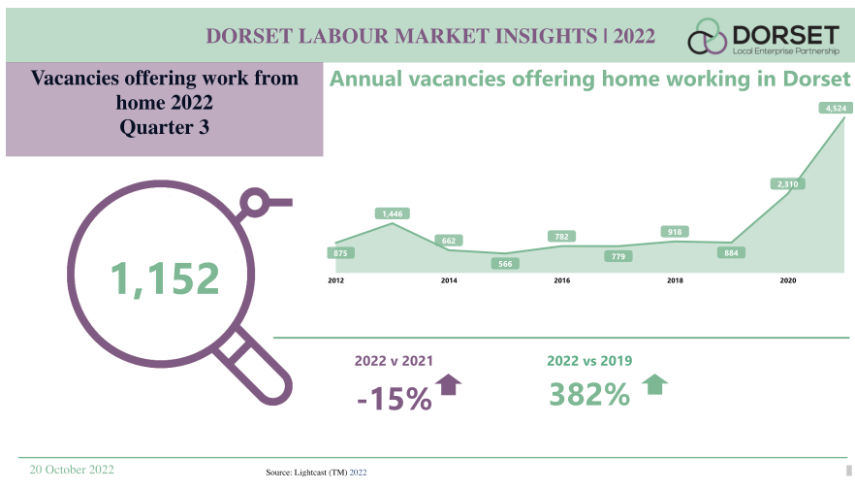Business | Posted on December 1st, 2022 | return to news
Dorset LEP reveals state of jobs market
Demand is high for carers and highly skilled workers despite a continuous decline seen in labour demand across the county.

The NHS is the largest employer in Dorset, followed by BCP and Dorset councils.
This has been revealed by the latest Dorset Local Enterprise Partnership’s Labour Market and Skills Report which covers July to September.
The report highlights a continuous decline seen in labour demand across the county after almost two years of unprecedented growth, despite the overall vacancies in the last quarter not far from the levels seen in the first quarter.
Overall, vacancies across the county for the first three quarters (circa 79,500) was a third higher than the same period last year and nearly double than 2020.
The report also captures information on:
- Homeworking – while the number of work from home vacancies increased exponentially over the past two years in Dorset, there was a noted slowdown in the last quarter (26 per cent down on the previous quarter).
- Employment – employment in the county fell, but rates remained comparable to the national rate. Unemployment also fell compared to the same period the year before. There was a significant drop in the proportion of economically inactive people who want a job (10,900 in June 22 versus 20,300 in June 21 but a big increase in those who are not seeking a job (82,700 versus 66,800).
- Top industries – over the first nine months of 2022, vacancy growth continued across most sectors of the economy in Dorset. The largest growth from the same period of last year was recorded in ‘accommodation and food service’ – more than doubling. There were almost 15,000 vacancies in ‘human health and social work’. Also notable was manufacturing vacancies surpassing the finance and construction sectors.
- Occupation trends – high skilled labour market continues to be strong with the scale of professional job vacancies now reaching pre-pandemic levels.
- Top jobs – carers and office assistants overtook nurses and software developers as jobs most in demand in Dorset. Other roles such as customer service, chefs, cleaners and kitchen staff continued to be in demand.
- Skills – most frequently requested soft skills were communication, customer service, management, sales, detail orientation and marketing.
- Salaries – advertised vacancies appear to suggest that wages are not increasing markedly – with offered salaries at best increasing marginally, or at worst remaining flat.
- Demographics – approximately 19 per cent of hospitality businesses said the proportion of over-50s in their organisations had increased in the past year.
Vinita Nawathe, executive director of Dorset LEP said: “The release of our latest labour market information is set against the volatile political and economic backdrop of the last quarter. The impact of rising prices has largely eroded any increases in wages which is also reflected locally.
“Reports that UK hospitality businesses are increasingly turning to older workers to plug staffing shortages is interesting, reflecting shifting demographics, as well as the continued demand for people to fill care roles which is only expected to increase as the county’s ageing population increases and shortages continue.”
The full report is available to read/download on the Dorset LEP website
Please share post:
Tags: #DorsetLEP, #jobs









